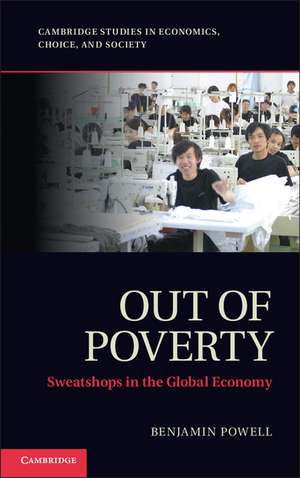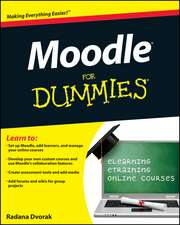Out of Poverty: Sweatshops in the Global Economy: Cambridge Studies in Economics, Choice, and Society
Autor Benjamin Powellen Limba Engleză Paperback – 9 mar 2014
| Toate formatele și edițiile | Preț | Express |
|---|---|---|
| Paperback (2) | 242.40 lei 43-57 zile | |
| Cambridge University Press – 9 mar 2014 | 243.55 lei 22-36 zile | |
| Cambridge University Press – 9 ian 2025 | 242.40 lei 43-57 zile | |
| Hardback (2) | 464.49 lei 22-36 zile | |
| Cambridge University Press – 16 mar 2014 | 464.49 lei 22-36 zile | |
| Cambridge University Press – 9 ian 2025 | 639.21 lei 43-57 zile |
Din seria Cambridge Studies in Economics, Choice, and Society
-
 Preț: 163.31 lei
Preț: 163.31 lei -
 Preț: 135.65 lei
Preț: 135.65 lei -
 Preț: 176.62 lei
Preț: 176.62 lei -
 Preț: 197.90 lei
Preț: 197.90 lei -
 Preț: 166.79 lei
Preț: 166.79 lei -
 Preț: 176.86 lei
Preț: 176.86 lei -
 Preț: 278.72 lei
Preț: 278.72 lei -
 Preț: 203.50 lei
Preț: 203.50 lei -
 Preț: 252.69 lei
Preț: 252.69 lei -
 Preț: 219.90 lei
Preț: 219.90 lei -
 Preț: 363.07 lei
Preț: 363.07 lei -
 Preț: 288.62 lei
Preț: 288.62 lei -
 Preț: 205.41 lei
Preț: 205.41 lei -
 Preț: 299.62 lei
Preț: 299.62 lei -
 Preț: 262.24 lei
Preț: 262.24 lei -
 Preț: 259.34 lei
Preț: 259.34 lei -
 Preț: 228.08 lei
Preț: 228.08 lei - 14%
 Preț: 725.57 lei
Preț: 725.57 lei -
 Preț: 291.68 lei
Preț: 291.68 lei -
 Preț: 290.38 lei
Preț: 290.38 lei - 11%
 Preț: 693.69 lei
Preț: 693.69 lei - 11%
 Preț: 705.18 lei
Preț: 705.18 lei
Preț: 243.55 lei
Nou
Puncte Express: 365
Preț estimativ în valută:
46.60€ • 48.78$ • 38.79£
46.60€ • 48.78$ • 38.79£
Carte disponibilă
Livrare economică 10-24 martie
Preluare comenzi: 021 569.72.76
Specificații
ISBN-13: 9781107688933
ISBN-10: 1107688930
Pagini: 198
Ilustrații: 9 b/w illus. 6 tables
Dimensiuni: 155 x 231 x 18 mm
Greutate: 0.27 kg
Ediția:New.
Editura: Cambridge University Press
Colecția Cambridge University Press
Seria Cambridge Studies in Economics, Choice, and Society
Locul publicării:New York, United States
ISBN-10: 1107688930
Pagini: 198
Ilustrații: 9 b/w illus. 6 tables
Dimensiuni: 155 x 231 x 18 mm
Greutate: 0.27 kg
Ediția:New.
Editura: Cambridge University Press
Colecția Cambridge University Press
Seria Cambridge Studies in Economics, Choice, and Society
Locul publicării:New York, United States
Cuprins
1. Introduction; 2. The anti-sweatshop movement; 3. The economics of sweatshop wage determination; 4. Don't cry for me Kathie Lee: how sweatshop wages compare to alternatives; 5. Health, safety, and working conditions laws; 6. Save the children?; 7. Is it ethical to buy sweatshop products?; 8. A history of sweatshops, 1780–2010; 9. The process of economic development; 10. What good can activists do?; 11. Conclusion.
Recenzii
'This eloquent book makes the compassionate case for sweatshops in poor countries as what poor workers voluntarily select as employers because they are better than the alternatives. It is uncommonly clear in this book that the economists' case for sweatshops is based on what's best for the workers, not what's best for efficiency or profits or First World consumers.' William Easterly, Co-Director, Development Research Institute, New York University, and author of The White Man's Burden and The Elusive Quest for Growth
'Ben Powell has written a brilliant and thought-provoking book on sweatshops. He challenges a number of critical beliefs about them which, although springing from concern about the poor, lead to policies that will harm the poor. No policymakers, especially in aid and development agencies like USAID and UNDP, can afford to ignore this masterly book.' Jagdish Bhagwati, Columbia University, and author of In Defense of Globalization
'The term 'sweatshops' is a dirty word to students on American campuses and activists around the world, implying exploited workers toiling in horrible conditions for long hours at low pay. Powell's splendid new book gives us another perspective: how workers view sweatshops as an opportunity for improving their economic condition. Indeed, countless Americans, Japanese, and others enjoy their high standard of today living because their grandmothers and grandfathers worked in sweatshops a century ago.' Douglas Irwin, Dartmouth College, and author of Free Trade Under Fire
'Ben Powell has written a brilliant and thought-provoking book on sweatshops. He challenges a number of critical beliefs about them which, although springing from concern about the poor, lead to policies that will harm the poor. No policymakers, especially in aid and development agencies like USAID and UNDP, can afford to ignore this masterly book.' Jagdish Bhagwati, Columbia University, and author of In Defense of Globalization
'The term 'sweatshops' is a dirty word to students on American campuses and activists around the world, implying exploited workers toiling in horrible conditions for long hours at low pay. Powell's splendid new book gives us another perspective: how workers view sweatshops as an opportunity for improving their economic condition. Indeed, countless Americans, Japanese, and others enjoy their high standard of today living because their grandmothers and grandfathers worked in sweatshops a century ago.' Douglas Irwin, Dartmouth College, and author of Free Trade Under Fire
Notă biografică
Descriere
This book explores how sweatshops provide the best opportunity to workers and the role they play in the process of development.













